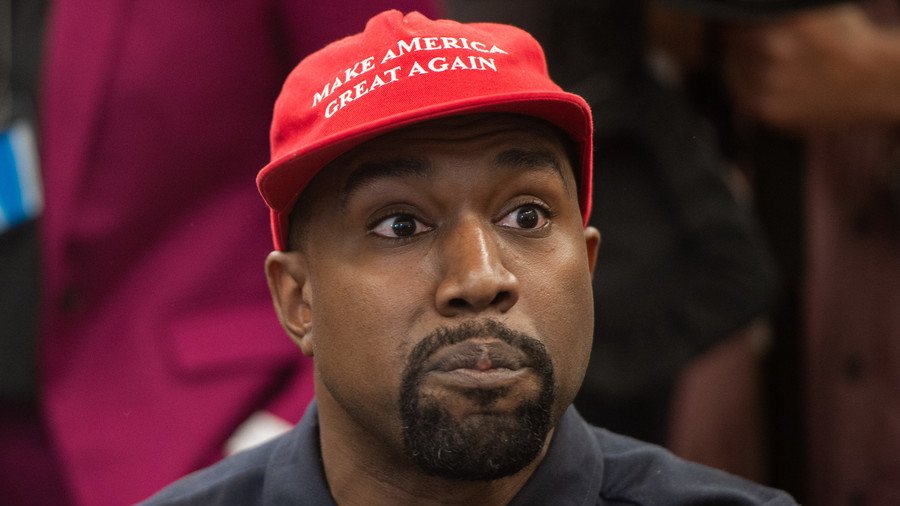The Kanye effect: Black Americans declaring allegiance to Trump may mean disaster for Democrats

With Midterms around the corner, some Black voters are tearing up their Democratic memberships, arguing the party no longer has their best interests at heart. Is this a new political trend or a mere flash in the pan for the GOP?
At least since the 1960s, following a raft of civil rights legislation put forward by John F. Kennedy, it has been accepted as gospel that the only party for African Americans is the Democratic Party. Today, however, some members of this demographic are beginning to stray from the pack, coming around to the conclusion they would be better off as card-carrying Republicans.
The latest phase of this political awakening, as it were, occurred last week as the singer Kanye West committed a heresy – at least as far as the Liberals were concerned – far worse than mocking Taylor Swift during a music awards ceremony. Not only did the star musician meet with Donald Trump in the Oval Office for a highly publicized ‘meeting of the egos,’ Kanye railed against the Democratic Party, blaming it for the many travails now besetting African Americans.
As Trump nodded in silent approval, West went off on a ten-minute tangent, tossing out juicy sound bites for the political pundits to chew over, arguing that “people expect that if you’re black you have to be Democrat.” On the question of sporting his bright red ‘Make America Great Again’ hat, West mentioned his fatherless childhood that lacked “male energy” and positive role models, saying the cap made him “feel like Superman.”
Thank you Kanye, very cool! https://t.co/vRIC87M21X
— Donald J. Trump (@realDonaldTrump) April 25, 2018
A bigger trigger could not be found in all of America, not even in a Clint Eastwood film. In other words, the Democrats went ballistic. After all, they know what is at stake here.
Kanye West’s comments today about African Americans and welfare were as objectively false as they were dangerous in perpetuating stereotypes that position low-income blacks as the face of America’s welfare system.
— Geoff Bennett (@GeoffRBennett) October 11, 2018
A tiny sampling of the massive outpouring of visceral hate Kanye endured could be summarized in a single remark by Michael Dyson, an African American academic who appeared on MSNBC, accusing West of committing – wait for it – “white supremacy via ventriloquism.”
“A black mouth is moving,” argued Dyson, “but white racist ideas are flowing from Kanye West’s mouth.”
So even when a black man articulates profound ideas of his own, he gets accused – this time by another black man, no less – of being the puppet of some white people and their racist ideas. To me, that sounds like Mr Dyson doesn’t have a whole lot of respect for the cognitive abilities of his own race, especially when not a word Kanye uttered in the Oval Office carried racist overtones.
Another Democratic defector is Candace Owens, an up and coming YouTube/Twitter star who argues that African Americans are trapped in a “hamster mentality” in that every four years they vote Democrat only to find themselves still stuck on the hamster wheel, forgotten by the very politicians they put into office.
Owens goes on to make a compelling yet arguable case against the stereotypical belief that the Democratic Party is automatically a force for good for black people. Although the Democrats under John F. Kennedy were responsible for ushering in the Civil Rights Act of 1964 (signed into law by Lyndon Johnson in 1964 following Kennedy’s assassination), Owens argues that the history before that event has been forgotten.
“Democrats are actually the ones who imposed segregation, and they were the ones majorly against voting to desegregate our communities in both the 1950s and the 1960s,” she states in one viral video, entitled ‘How to escape the Democratic plantation. “By 1900, twenty-two black Republicans served in the US Congress. The Democrats didn’t elect a single one until 1935.”
I love the way Candace Owens thinks
— ye (@kanyewest) April 21, 2018
In the heat of the 2016 Presidential Election, another YouTube sensation, comprised of two black sisters from North Carolina who go by the name ‘Diamond and Silk,’ announced to their nearly one million Twitter followers they would not be voting Democrat because “Hillary Clinton is not our slave master.” These Democratic dissidents love to remind their audiences that Abraham Lincoln, for example, was a Republican who was responsible for ending slavery a long time ago and therefore African Americans should line up and buy the Republican brand today. If only history were so simple.
We love and support our President.He's done more for black people than any other President in our lifetime. While others may stab him in the back, we will always have his back!@realDonaldTrump@POTUSpic.twitter.com/4lf3Mse1j6
— Diamond and Silk® (@DiamondandSilk) August 13, 2018
At first glance, it is tempting to dismiss these dissenting voices as mere blips on a vast radar screen, a tiny percentage of the estimated 38 million African Americans now living in the US. And that may be very true. After all, the maddening thing about living in the age of social media is that events that seemed of paramount importance one day slip away into complete irrelevancy the next.
Nevertheless, there are some indicators out there to suggest that many African Americans appear to have found some redeemable qualities in Donald Trump.
Although it is no secret that poll numbers can be expertly massaged to produce the desired response, a recent tally of the president's approval rating indicated that 36 percent of African-Americans viewed Trump favorably. If correct, that is nearly double his level of support registered among that demographic group one year earlier. That figure sounds even more impressive when it is considered that Trump attracted just 8 percent of the African-American vote in 2016.
However, here is where the situation gets more complicated.
Many observers argue – and rightly, it would seem – that Trump is simply basking in the afterglow of his predecessor, Barack Obama. During the two-term presidency of America’s first black president employment rates among black Americans began to surge, continuing an upward trajectory that spliced into Trump’s presidency.
Thus, it was no surprise that Democrats cried foul in April of this year when Trump assumed all the credit as unemployment rates among African Americans fell to 6.6 percent — the lowest such rate on record.
400% percent increase in black business start-ups. Record low unemployment.Against all odds, @realDonaldTrump has taken a stand for the black community. It’s time for us to raise up and defend him against the RACIST left. https://t.co/Jy2OHehdjd
— Candace Owens (@RealCandaceO) October 14, 2018
Trump is certainly not the first president to portray the positive results of his tenure as due primarily to his own personal efficacy and skills. At the same time, with the midterms fast approaching, the Democrats will be working hard to remind their base about their own contributions, probably twisting facts as well. In short, both sides will be fighting hard to win the votes of the African American community, which carries enough weight to tip the scales one way or the other.
Regarding the question as to which party is best suited to represent black Americans it is probably too early to say. Maybe neither. Maybe America needs to finally get a third-party option that breaks the two-party paradigm that the country and its people seem reluctantly stuck with.
The most important thing, however, is that this critical conversation has begun among African Americans. Finally, this long-oppressed demographic is waking up to the realization that it has immense influence inside of America’s two-party political system, and all the more so with the critical midterms just weeks away.
Indeed, the African American vote may very well decide the trajectory of US politics for many years to come, and politicians ignore this group at their own peril.
Like this story? Share it with a friend!
The statements, views and opinions expressed in this column are solely those of the author and do not necessarily represent those of RT.














